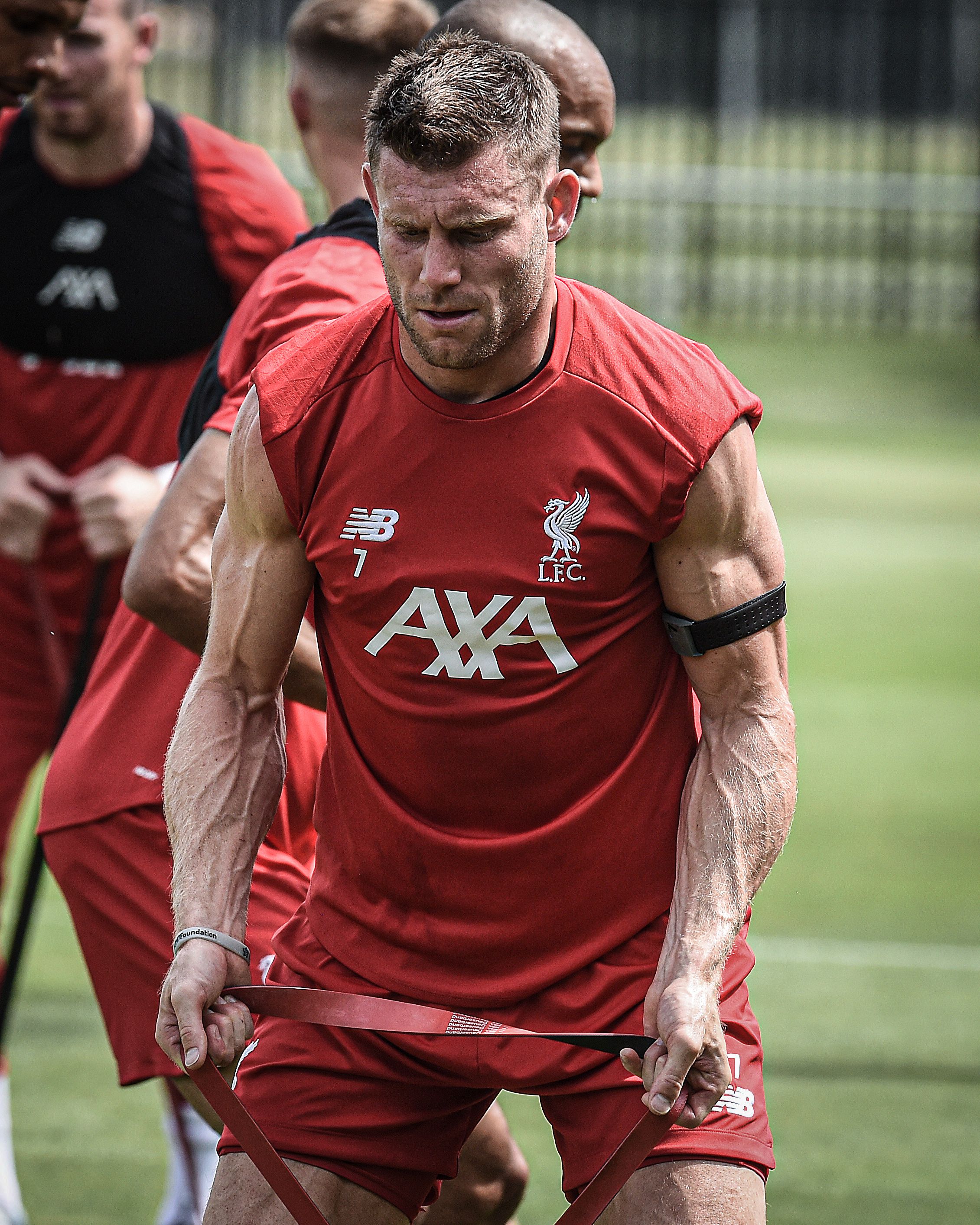Professional footballers are some of the fittest and healthiest people in the world; they not only have to train hard to stay match fit, but they also have to ensure they're eating right to keep their energy levels up and recover effectively between games. In this article, we take a look at how to eat like a professional footballer, whether you want to get your game on or just give yourself an edge at the gym.
Meal times
A football player needs energy all day, so they need to eat every few hours. There are lots of snack and energy products they can use alongside a balances diet on the go, such as energy bars, gels and drinks. They may have breakfast followed by a pre-training meal of wholemeal bread, banana, and honey; lunch with rice, vegetables and chicken; before eating again after training or in the evening with brown rice, vegetables and fish.
Eating right starts the day before (or during training)
Players (or anyone with a game the next day) should focus on their diet long before game during their training. However, eating right the day before can have a huge impact on your performance, especially if you're match starts first thing in the morning.
Eat little & often . You're probably familiar with the term "Carb-loading". Which is important especially if you're racing for longer than 90 minutes. You want to build up your muscle Glycogen levels, so eating little & often ensures you maintain full energy stores throughout the day. The key is to play it safe, stick to what you know, simple and easy to digest foods. It's all about focusing on less protein and more carbs.
Hydrate well. By staying well hydrated throughout the day it means you have less to worry about the next morning, it's easy to become dehydrated over night.
Top tip: You can measure how well hydrated you are from the colour of your urine! You should aim for a light straw colour and if you're passing fluids fast, increase your electrolytes intake. Read more about electrolytes and follow our urine chart here. You can top up your electrolytes using sports drinks such as KMC ISO MIX here.
Avoid new, risky, spicy and greasy foods, meals that contain a lot of sauces and cut out red meat because it takes a while to digest. Avoid too much fibre as this also slows down your digestive system and affects your performance.
Eat Smart & use the rule of thirds. A really simple way to eat smart before your event is to divide your plate into thirds. 1/3 Carbs, Protein & Veg. If you're going to be working for a longer period of time, up your carbohydrate intake!
Breakfast is key
One of the final stumbling blocks after putting in the work during training and eating right the day before.
When you should eat. Our advice would be to eat 2-4 hours before you start your race.
How much you should eat. You should be looking to consume between 1-2g of Carbohydrate per kg of body weight.
What you should eat. This should be predominantly carbohydrate based. Fruits, porridge, oats, toast, pancakes and other complex cabrs. Some protein is also important found in yoghurts and eggs. Avoid black pudding, sausages and bacon. Our simply delicious Superfood Bar makes for a great addition at breakfast with 40g of Carbohydrate and 5.6g Protein here.
Hydrate well (again). It's natural to wake up slightly dehydrated. Make sure you take on board fluids following our little & often rule. KMC ISO MIX will help and other fruit juices can also help increase your Carbohydrate intake.
(You don't have to avoid Coffee). Coffee, or should we say Caffeine, actually has many proven benefits. Research shows that it can help improve muscular endurance and strength, as well as it's well known benefits in reducing fatigue and drowsiness.
Refuel during your game
It's difficult to try and manage any fuel consumption during the match but the easiest way to stay on top is keeping your bottle pre-filled with with sports drinks such as KMC ISO MIX and taking a drink each time the bottle cage is available, following our little & often rule. Most professionals will also have an energy gel before kick-off and at half-time. A perfect opportunity to get on top of Carbohydrate, fluids and electrolytes.
Football supplements & snacks
Energy - energy gels can be eaten during exercise to provide an instant boost of sugar and electrolytes (sodium) lost through sweat. This is why many players prefer energy gels over energy bars. It's easy for them to carry with them and gives them an instant boost of energy after a hard workout. Energy gels are also good for rehydrating, as they have electrolytes in them which helps replace what was lost during exercise and reduce your risk of muscle cramp. KMC NRG GEL contains 27g of Carbohydrate and all 4 essential electrolytes.
Hydration - Dehydration has a big impact on performance and is associated with loss of motor skills and impeded concentration. You should also include electrolytes in your drink. These are minerals which have a key role in many bodily functions, specifically fluid balance. Their charge helps pull water from your blood into your muscles. The important electrolytes for athletes are sodium, magnesium, calcium and potassium. Which can all be found in KMC ISO MIX.
Recovery - Professional footballers need more protein in their diet than the average person because they are constantly on the go and breaking down muscle. One popular drink is a protein shake mixed with water, yogurt or juice which can contain as much as 21 grams of protein per serving. Such as the KMC PRO MIX. Protein bars can also be eaten at any time of the day.
James "boring" Milner - The ultimate professional footballer diet
Liverpool midfielder James Milner, 36, is arguably one of footballs most insanely fit players. Despite being one of the oldest player in the squad, he famously beats everyone else in Liverpool's pre season lactate tests, which takes the lactic acid level of players after they've run an increasing distance, with players with levels too high being knocked out a long the way.
His Diet
"You need a balanced diet, making sure you're getting all the major food groups on board.
Pasta, sweet potato, rice or noodles will all give you a decent dose of carbs, which give you energy for training.
Eat plenty of fish. You can take fish oil supplements if you don't like seafood. Chicken and eggs are other great sources of protein.
I'm a bit strange during the off-season - I don't eat much because I enjoy not having to eat. We play so many games that we're always forcing food down ourselves to either recover or prepare for the next game."
"Scrambled eggs on toast" - What Milner has for breakfast ahead of a hard day's training.
Recovery
"With the amount of miles you cover in one week during training and games, your body is aching by the end of the season - so it's nice to have a two week period where your body settles down."
Training
"Try out the dickie bow drill. Jog along the width of the 18-yard box. Once you reach the corner of the penalty area, run diagonally to the opposite corner. Then you jog along the other side of the penalty area and run diagonally back to the start. Do that six times."
"After a fortnight off, your body stiffens up. You have to get out the WD40 and get the body going again. People always think 'train, train, train', but your rest days are as critical as your training days."
4x4 minute runs
"There's no point doing a six-mile run. Football requires interval training. Your running needs to be specific to the position you play. Run as hard as you can for four minutes, then rest for four. Reduce the rest time as you get fitter."
James Milner lesser known facts for the ultimate super fan
13.56km -Distance covered by Milner during Manchester City's win against Stoke - the furthest by a single player in the Premier League so far this season
130kg - What Milner lifts on the leg press

How to fuel your game - Supercharge your 90 minutes - Tips, Guides & News - Kendal Mint Co® | KMC
Our match day selection...
Energy:
1x KMC Natural Superfood Bar
2x KMC Energy Gels
(1 or 2 x KMC Caffeine Energy Gels)
Hydration & Electrolytes:
2x Serves of KMC ISO MIX Electrolyte & Energy Drink Mix
1x 500ml Bottle (100% Biodegradable)
Protein & Recovery:
1x Serve of KMC PRO MIX Protein Recovery Mix






